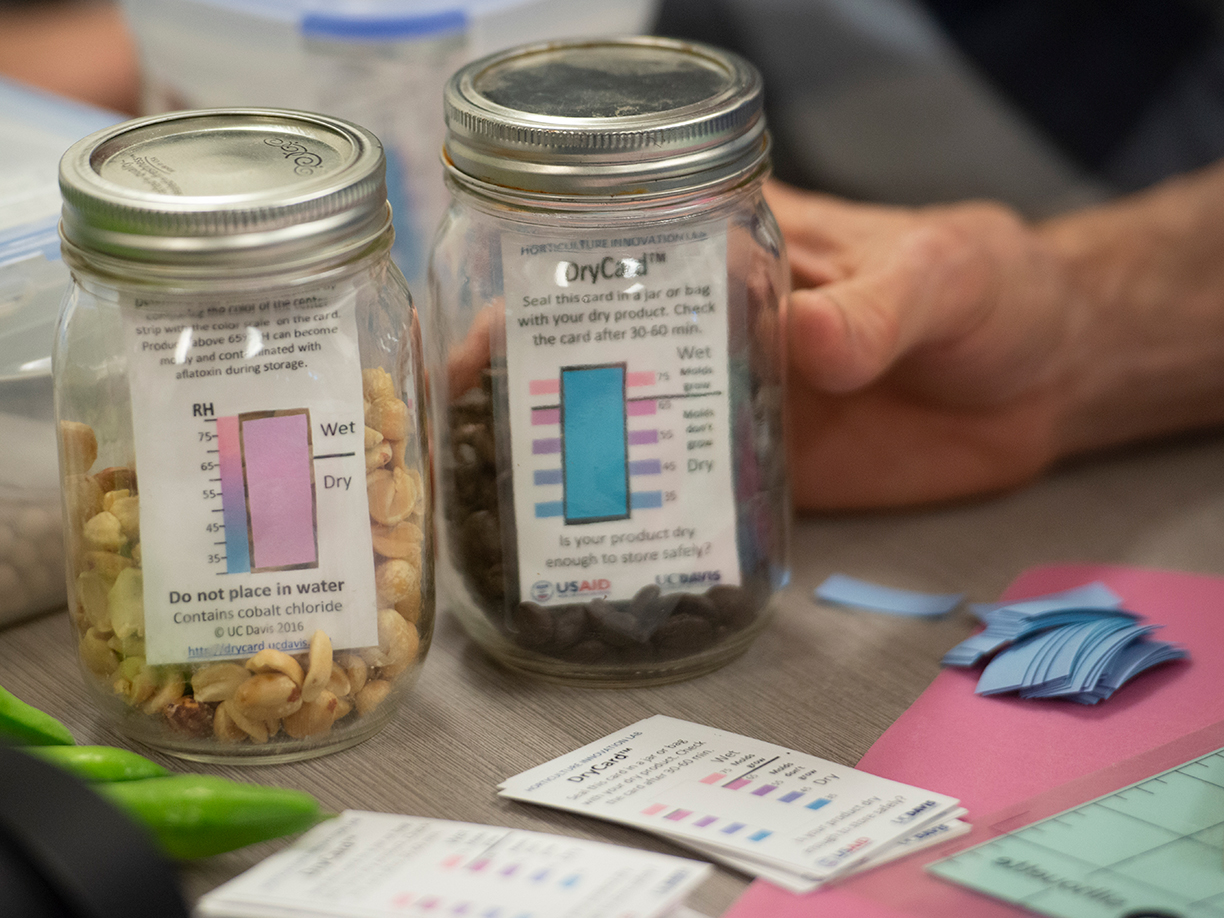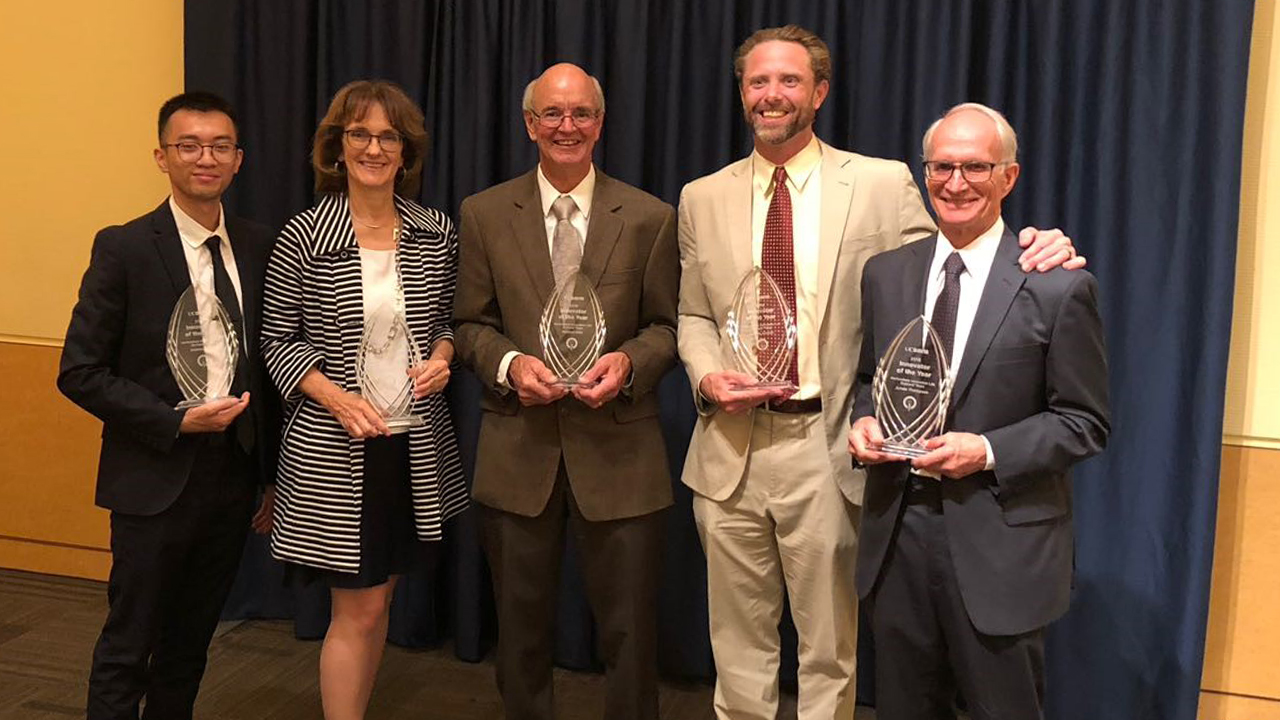
The Horticulture Innovation Lab team that invented the DryCard™ and has been working over the last year to introduce this low-cost dryness indicator to the world was honored by the UC Davis Chancellor's Innovation Awards earlier this month.
The team — made up of Michael Reid, James Thompson, Elizabeth Mitcham, Anthony Phan, Angelos Deltsidis, Archie Jarman, Brenda Dawson and others from the Horticulture Innovation Lab — was one of two recipients of the 2018 Innovators of the Year award, which includes a $10,000 prize for university research and outreach efforts.
Read more about the UC Davis Chancellor's Innovation Awards recipients.
“These honorees reflect the growing importance of UC Davis as an incubator and promoter of innovation, not just in the Sacramento region, but in the world,” said UC Davis Provost Ralph J. Hexter, according to a UC Davis press release. “They are groundbreakers in finding new ways to feed the world, build community and develop technology that creates a better tomorrow for all.”
To circulate news of the award, UC Davis also created a 2-minute video about the creation of the DryCard, as 2018 Innovator of the Year.
Like a thermometer, but for dried food storage
During the award ceremony on May 15, Michael Reid, James Thompson and Elizabeth Mitcham provided comments in accepting the award.
"Our program's goals are advanced by the work of many experts at UC Davis, other U.S. universities and developing country scientists. We're especially proud to work with such innovative scientists at UC Davis as Michael Reid and Jim Thompson," said Mitcham, as director of the Horticulture Innovation Lab in accepting the award. She also highlighted Anthony Phan's work in fostering entrepreneurs in developing countries to manufacture and sell the DryCard.
Thompson noted that the DryCard is "the crucial tool that has been missing" when it comes to measuring dryness in food systems.
"Just as a thermometer is used to manage the temperature of perishable food in the cold chain, the DryCard allows people to manage the dryness of durable food in the dry chain," Thompson said during the ceremony.
"The DryCard is reusable, inherently accurate, and simple enough to be made and sold by local entrepreneurs. It has the potential to be a sustainable and easy-to-use tool to improve the health of millions of people, especially people living in the humid tropics," Thompson said.
Reid highlighted the role of Bertha Mjawa in Tanzania in becoming one of the first entrepreneurs to begin producing and marketing the DryCard in her own country—and noted the award's prize funds could further similar efforts.
"This prize provides us with the opportunity to identify and fund more entrepreneurs like her and spread this card around the world where it will be used for preventing this toxic contamination of foods," Reid said.

Working with entrepreneurs to market DryCards in Africa, Asia, Central America
Since launching the DryCard in 2017, the Horticulture Innovation Lab team has built up a network of independent entrepreneurs and small businesses who have helped to manufacture, sell and distribute more than 10,000 DryCards in places such as Tanzania, Rwanda, Ghana, Guinea, Mexico, Guatemala and Thailand.
Representatives from a number of organizations and institutions have also requested samples of the DryCard to test and introduce via their work in local communities — including FAO, USDA, USAID, CIMMYT, Catholic Relief Services, International Relief Committee and Mercy Corps.
So far, the DryCard team at the Horticulture Innovation Lab is working with a basic business model that includes providing materials for entrepreneurs and small businesses to make their first 10,000 DryCards which they can sell for a profit. The team provides ongoing technical support related to use and production of the DryCards and tracks sales information globally.
For more information about getting DryCard samples or partnering with the DryCard team, visit http://drycard.ucdavis.edu.
More information:
- UC Davis article and video: DryCard Invention Wins Chancellor’s Innovators Award to Reduce Food Loss Globally
- Award press release: UC Davis Innovators Honored for Contributions in Agriculture, Pathology
- More information about the DryCard, including sign-ups for partnerships and samples
